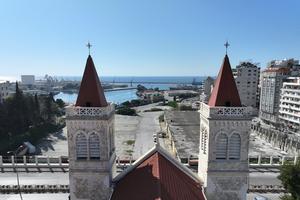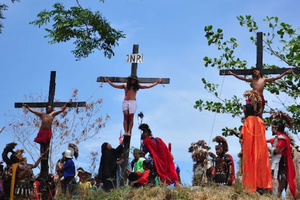Radical Global Changes Ahead Could Be Destructive for the Cause of Persecuted Christians, Expert Alerts
For the head of international advocacy at Aid to the Church in Need, the global context marked by electoral campaigns and economic and social tensions is placing the cause of fundamental rights at the back of governments’ minds.

Escalating economic and geopolitical crises around the world are dealing a severe blow to the cause of persecuted Christians, according to the head of international advocacy for Aid to the Church in Need (ACN), Marcela Szymanski.
“This year will be marked by radical changes around the world, and as political, economic and social upheavals unfold, the fundamental rights of citizens will be relegated even further down the ladder of priorities,” Szymanski said during an international conference in Budapest, Hungary.
She stated that since the beginning of 2023, advocates of religious freedom have had to come to terms with the fact that the next two years “will be so caught up in electoral processes that we will find it harder to address the political decision-makers who are in a position to impact the destiny” of Christians and other victims of human-rights violations. She also expressed concern at the gradual exfiltration of religious freedom and freedom of conscience from international law.
According to ACN’s latest report — “Persecuted and Forgotten?” — Christian persecution has increased in most of the 18 countries surveyed between 2022 and 2024. Radical Islam was found to be the main cause of persecution in all African countries reviewed, with the report also finding that “the epicenter of militant Islamist violence has shifted from the Middle East to Africa.” World powers such as China, India and Nigeria have also seen an increase in Christian persecution and oppression, while Daniel Ortega’s Nicaragua was featured for the first time in the report’s history.
US Elections Have Not Had the Hoped-for Effect
Speaking with the Register on the side lines of the Nov. 20 conference “Solidarity with Persecuted Christians” at Budapest’s Ludovika University, within the framework of Red Wednesday 2024, an annual awareness campaign promoted by ACN, Szymanski clarified that the recent and much-anticipated U.S. elections have not yet had the effect she and other organizations were hoping for, that is, to cool down the global upheavals that benefit the perpetrators of persecution.
The international news of recent weeks has in fact been marked by alarming escalations, especially in Ukraine, which was the target of indiscriminate Russian strikes, amidst the strengthening of military ties between Moscow and North Korea. The situation is hardly more reassuring in the Middle East, where the Israeli-Palestinian conflict has spread to Lebanon. The Syrian capital of Aleppo has also just fallen into the hands of jihadist rebels, making the fate of the region’s Christian communities even more uncertain.
“Donald Trump’s victory, while clear-cut, is proving to fan all the flames of international conflict that needed to be extinguished, and it seems to preclude opposition cooperation for peace,” Szymanski said.
On the European front, the latest elections in June 2024 also brought their share of surprises, with the founding of a new coalition of right-wing parties, Patriots of Europe, which immediately established itself as the EU’s third political force. The effect, according to Szymanski, has been to disperse the traditional allies of the defenders of religious freedom, generally grouped in the Christian Democrat parties.
“We now see our traditional allies in governments and multilateral agencies scrambling to address economic and security concerns, and we don’t expect much attention for some time,” she continued. She also emphasized that, in order to best face this adverse context, ACN was equipping itself with artificial intelligence tools to optimize and make more visible its communication with political players and civilian populations, regardless of societal crises.
Erosion of Religious Freedom in International Law
Another major concern is the defense of religious freedom as it relates to international law. Szymanski has observed growing confusion surrounding the freedom of thought, conscience and religion enshrined in Article 18 of the United Nations Universal Declaration of Human Rights. She believes that this right, originally conceived as an indivisible whole, is increasingly being dislocated in favor of freedom of thought — to the detriment of religious freedom.
In 2023, ACN expressed concern at a report by the U.N. special rapporteur on freedom of religion or belief that “negated the internal harmony of this triadic right” that “opens space for the transcendent conscience of each person to think, feel, decide, and live in accordance with the most essential questions about our human life and final destiny.”
Legal expert José Luiz Bazán reckoned, in his remarks for ACN, that the “attempt to subordinate religious freedom to freedom of thought and conscience would demote freedom of religion to a ‘second-class’ freedom” and that, ultimately, “freedom of religion would become freedom from religion.”
“I noticed this same tendency on a European level, in particular through the 2020 “Eurobarometer on Values and Identities” of EU citizens, where freedom of expression and thought remains one right while freedom of religion is another, and freedom of conscience is basically gone from the picture,” Szymanski commented, considering that this could seriously undermine the freedom of Christians around the world.
Her fears were heightened by the inclusion of abortion in the French Constitution in March 2024 and the subsequent attempt to amend the EU Charter of Fundamental Human Rights in this direction, which will necessarily jeopardize freedom of conscience. “We are preparing the ground to impose on the citizens that the rights of others overrule their right to act according to their conscience and that they are liable of a constitutional crime should they oppose,” she concluded.
“These are drifts that should not be underestimated in the current global context and that we need to anticipate so that we don’t one day have to wake up and find that it’s already too late.”

















